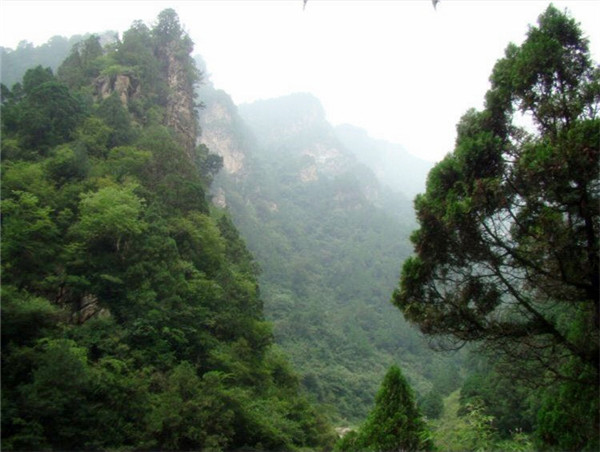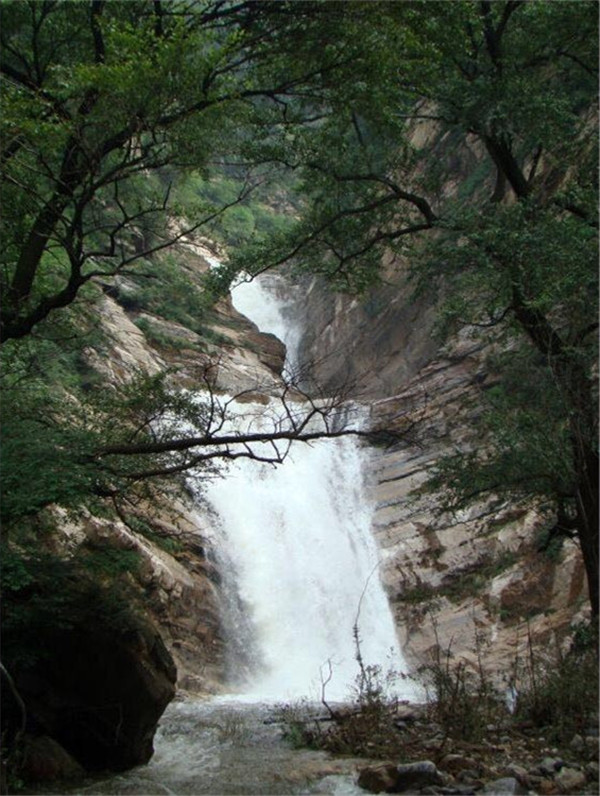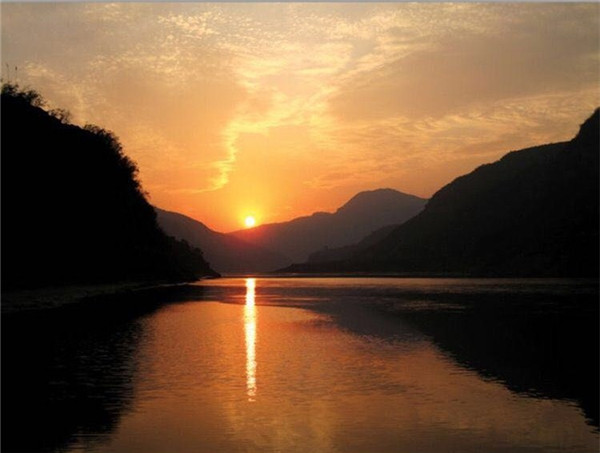
From the Taikuan River in Xiaxian County to the Xiajian River to the Longdou gorge, there are mountains all around, hundreds of mountains compete for beauty with dense forests and precious resources. There are both beautiful and fertile natural resources, as well as ancient and strange myths and legends. Furthermore, many Red Memories of Anti-Japanese soldiers and civilians fighting against the enemy. From front to back, from top to bottom, the valleys here are surrounded by green mountains with old trees, deep ponds and dense forest, slowly rising rosy clouds, with clear four season scenery. Here the wild fruits are fragrant; the valleys are deep and forests are dense. It is a beautiful and miraculous place hidden in Zhongtiao Mountain. It is a good place for people to travel, relax and convert to nature.
Old Dragon Pond Scenic Area of Zhongtiao Mountain Grand Canyon has a total length of about 7 kilometers and integrates mountains, water, sound and color in one. The air is fresh; the birds are singing; the mountains are high and rivers are long. Its culture and natural landscape can be found everywhere. Myths, legends and historical allusions can be seen everywhere. In particular, there are thirteen pools of water three kilometers behind the gorge. Each is different and each has its own wonders. It is a feast for the eyes, lingering, especially impressive. This is exactly: "There are thirteen pools of Longdou Gorge. Each pool has a good scenery. Shigang Company develop it. All tourists are delighted."
【Phoenix Mountain】
A long time ago, the phoenix (Fenghuang), the king of birds, prepared to hold a bird meeting to discuss how to use its own advantages to serve the people. In order to hold this meeting well, phoenix and his deputy peacock made full preparations, deciding to hold the meeting by the old dragon pond. The meeting lasted for 21 days, and the focus of the meeting was how to serve the people based on their respective advantages. According to the arrangement of phoenix and peacock, 100 birds have made a positive statement: chickens, ducks and geese decided to lay eggs in return. Pigeons in return for a message of peace; Wild geese, magpies reported good news in peace to return; Sparrow was small but also wanted to put themselves as medicine to return...... Only harpy roc, relying on their own fierce and doughty, did not change their nature of harming people, wildly arrogant. After hearing what they said, phoenix and peacock could not help but furious, and decided to kill their prestige. So both sides fought beside the old dragon pond. However, eagle owl and roc were so terrible! They flew from the sky to the earth, fierce as a hurricane. Phoenix and peacock were no match for them and nearly lost their lives. At this time, the old dragon in north sea shook his head and wagged his tail, rose into the air, and with only a few tricks, beat the eagle and kunpeng out of breath and fled in confusion. The phoenix and the peacock were too tired to move. Later, people found that on the big stone where they were sleeping, there were not only the footprints of phoenix and peacock, but also a pool of clear water under the stone. For the first look, it looks like a phoenix, but the second time, it looks like a peacock. So the local people called the mountain "phoenix mountain". Phoenix mountain is as beautiful and attractive as the phoenix, with full of pine and cypress on her hillside, and tinkling streams. In leisure time, people always got together here to enjoy the gift of nature. This is the origin of the phoenix mountain.

【Old Dragon Pond】
“Mountains are famous for living saints and waters gains miraculous reputation for its residing dragons.” Old Dragon Pond is the last pool of water in the Phoenix Mountain Grand Canyon, also the most beautiful, the most peculiar scenic spot of phoenix mountain, as well as a rare fairyland on earth. According to the legend, in ancient times, the little dragon king was allowed to stay and play by the old dragon king, and the old dragon king also felt that the scenery here was charming, the pool was big and deep. It is really a good place to enjoy life. When the business of the court of heaven was finished, he went back to the pool of water on the phoenix mountain and lived there and did many good things for the common people.
That year, there was no rain for a long time. Every day, people encountered a hot sun in the sky. The earth dried up and the drought reached an amazing level. The leaves turned yellow, the seedlings were half dead, the well water dropped, the spring water dried up, the reservoir reached bottom, the river stopped flowing, even the world-famous Yellow River was so small and weak that an urchin could cross. Many villages have problems with drinking water. What about the harvest in autumn? People's hearts are unstable and very bitter, without any way. Just then, an old man said, "I heard that there is a big deep pool on the phoenix mountain, and there is an old dragon in it. Out there, smoke wreathes with green gas into the sky every morning, and there is a trace of reiki. Why not ask the old dragon for favor and rain and save all the people from the midst of fire and water?" Hearing this, everyone felt that the old man had a point. Then people wore feather towel on their heads, straw sandals on their feet, beating drums and gongs, waving sticks, they came to Old Dragon Pond in groups. The old man burned incense, kneeling, reading the mantra, after that, placed the sealed bottle into the pool. After a while, he lifted the bottle out with a rope and found it almost full of water. The old man was overjoyed and told everyone that the old dragon had arranged seventy percent of the rain. Before he could finish, everyone heard the thunder, saw the lightning flash and the clouds roll. Suddenly it began to rain cats and dogs for three hours. The long dry seedlings met the timely rain, the earth was immediately filled with green, people were so happy to praise the rain in unison. The old dragon king was always ready to satisfy the people. This is the legend of Old Dragon Pond.
Old Dragon Pond is magnificent with delightful scenery. The rocks here are beautiful, the trees are towering, especially when the sun slanting, two rainbows are formed to sky, this is the famous "Dragon Pond Double Rainbows". As the saying goes, "You couldn’t be called a man until you reach to the Old Dragon Pond, where you will enjoy different life". During the Anti-Japanese War, the seventh office of the Kuomintang was stationed in Xiajian Village, not far from here. Commissioner Guan Mingquan and his subordinates visited this place and wrote a poem of "The 100-meter waterfall converge into the Old Dragon Pond, where you and I lean on the rock to enjoy the scenery", which is widely spread among the people. This is exactly: the poem left by the commissioner in those days which have been handed down from generation to generation.
【Dutangzhai Fort】(Li Yukui, a famous general in ancient time)
Dutangzhai Stronghold site is located in the phoenix mountain of Xiajian Village, Caochuan Town. It is 100 meters long from north to south and 70 meters wide from east to west. It was built by Li Yukui, a general in the late Ming Dynasty. Li Yukui was a native of Dujiaya Village in the old town of Pinglu. Since his childhood, he has been gifted with wisdom and knowledge. When he went to school, he always came out on top in every exam. When he grew up, he successively passed the imperial examinations at the provincial level and then the highest imperial examination. He was proficient in everything and favored by the emperor. At first, he worked in the highest organ of the criminal law, the "Jisi Temple". Several years later, he was in charge of state military secrets, later on he was appointed as the Governor of Ningxia. The masses habitually called him Li Dutang.
Li Dutang was praised for his honest and upright life as an official. When serving at the Jisi Temple, He often went deep into the people, understand the details of the cases, so that some unjust cases have been rehabilitated, thus saved many people who were wronged. After serving as minister of defense, he was ordered to participate in politics in Shaanxi Province. At that time, the local power was controlled by local elites, who misbehaved and the people complained a lot. After Li Dutang came to office, he did not fear the power, carried out a bold rectification and abolished the unreasonable system. He weakened the local forces, relieved the suffering of the people, and executed orders and proclaimed prohibitions, making the production of Shaanxi get certain development.
Ningxia was located in the border region, living conditions are difficult, but the court rarely cared about. Border guards have repeatedly called for changes in poor treatment, but none has materialized. Therefore, the army was slack and ready to mutiny. After Li Yukui became governor of Ningxia, he went deep into the soldiers, telling them the right things, and solved practical problems properly. Thus, the mood of officers and soldiers was stabilized, contradictions were alleviated, and the border defense was consolidated. During his four years in Ningxia, he initiated the army and the people to build water conservancy projects and develop production, and made great achievements.
After the perishing of the Ming Dynasty, Li Yukui, an old minister of the previous dynasty, witnessed the barbarous acts of burning, killing, looting and pillaging by the Qing soldiers. He was indignant and deplored the fall of the Ming Dynasty and determined to reverse the Qing Dynasty and restore the Ming Dynasty. For this purpose, he sold his wealth, contacted three thousand strong men of his hometown, and gave them strengthened training. This is where the name Bingyangpo Slope, on the North Street of Pinglu County, comes from. It is said that "Shi Yanwang (Yama)" of Taichen Village, "The Thief Xue" of Zaogou Village and "Judge Li" of Huangdui Village were all famous generals under Li Dutang. They were brave and resourceful in battle, which frightened the Qing soldiers. Li Dutang also secretly contacted Zhang He from Mianchi County and Zhang Wu of Xiashi. They supported each other with great momentum. At that time, Pinglu County, Xiaxian County and Yuanqu County and also Shanxizhou County and Mianchi County in Henan and other places were all in their control, and Phoenix Mountain area was the base of their restoration of Ming and resistance of Qing dynasty.
In the early Qing Dynasty, the imperial court appointed Wu Sangui, Geng Jingzhong and Shang Kexi, the surrendered generals of the Ming Dynasty, as kings, and let them defend Yunnan, Sichuan and Guangdong which are called "San Fan ( three vassal states)". Later, "San Fan" mutinied, the court had to send troops to suppress. Li Dutang took the opportunity to lead the rebels north, for a massive attack. When they attacked the present border of Linfen, they were blocked by the Qing army. Li Dutang and his soldiers retreated to the Dalang Temple, Sizhou Mountain and Men’gan Mountain in Pinglu, and fought a long and bloody battle with the Qing soldiers. Now 400 meters northeast of Shangji Village in Qinglan Township, there is the tomb of Li's dead soldiers, which is 80 meters long from north to south and 20 meters wide from east to west, which bloodily witnesses the cold flames and smoke of gunpowder then. Later, Li Dutang led his troops to retreat to the Phoenix Mountain, north of Xiajian Yukou Village. They fought with the Qing army for three years, but eventually because of being outnumbered, they ran out of ammunition and food, the whole army was completely annihilated, Li Dutang and all the soldiers were martyred.
To commemorate them, later generations called the fort where they had been stationed "Dutangzhai Fort", setting up a stone at the mouth of the fort, on which was engraved the words "The hiding place of Li Yukui, Governor of Ningxia and Jinshi (a successful candidate in the highest imperial examinations) of the Ming Dynasty". Outside Yukou Village, there are mass graves of their soldiers killed. The modern poet Wang Conglong specially wrote a poem which goes like this:
It is a wise thing to do in those days that they would not surrender to the Qing Army even though they knew the Ming Dynasty has gone.
Three thousand knights were unwilling to be captured, and five hundred heroes were soldiers in revolt.
The wall standing in the east mountain reminds people of the sad past. The river flowing into the Western Xia reminds people of the flourishing past.
Now I also learn from Dong Hubi by picking up the pen in the lonely room, with the oil lamp, to write their names down one by one.
【Ximenghui Martyrs Monument】
During the Anti-Japanese War, the areas of south of Xiajian Village, Pinglu County of Shanxi Province and east of Zhangmao Town of Henan Province gradually formed the bases of the Anti-Japanese united front. The military and political center of the base area was in the old revolutionary base area of Caochuan. In the military aspect, the second war zone, commanded by Wei Lihuang, was stationed in Taizhai Village. Sun Weiru's fourth group army headquarters was stationed in Guojiayuan Village. The 38th army, commanded by Zhao Shoushan, was stationed in Wangyuan Village. Yan Xishan's seventh district security headquarters was stationed in Anpu Villag of Cao Chuan. The 59th regiment of the Taiyue military region, led by the communist party, was also a regular presence. In the political aspect, Kuomintang Anti-Japanese commissioner office of the seventh district of Shanxi Province was stationed in Xiajian Village. The seventh commissioner office of Shanxi Province, led by Yan Xishan, was stationed in Anpu Village. The seventh central committee and the workers, peasants, youth, women and other mass organizations of Shanxi Ximenghui were stationed in the Heliyao and Yanjiashan area. The Prefectural Party Committee of Zhongtiao Mountain was stationed in Yatou at first, later moving to Longtangou Village. Here, the Kuomintang, Yan Xishan and the Communist Party formed a new union and struggled against Japan. In 1939, the government officials proposed to the justice regiment of Ximenghui in Xiaxian County to set up a "monument of thirty-three revolutionary martyrs”, which recorded Zhao Fei, Li Zengrui and other thirty-three martyrs' origin, age, title, time and reason of sacrifice. The monument, 1.36 meters high and 0.36 meters wide, is now under the protection of the county cultural heritage bureau. Ximenghui of Shanxi Province is an anti-Japanese force held by the Communist Party. Zhao fei, Li Zengrui and others sacrificed their lives for the country, whose deeds are unforgettable to all Chinese people, so this monument is erected to commemorate them.
【The Footprint of a Great Man】
In Jiang Linli’s Courtyard, Taizhai Village, Caochuan Town, a great man, called Zhu De, the Commander-in-Chief of Communist Party and Wei Lihuang, the commander of Kuomintang first war zone, negotiated for an event. After Lugouqiao Event, Japan launched an all-out war of aggression against China. In March 1938, the Japanese aggressors reached the Phoenix Mountain. At the beginning of 1939, the headquarters of Wei Lihuang, commander of the first war zone of the Kuomintang, was located in Taizhai Village, Caochuan Town. In order to promote the consolidation and development of the anti-Japanese united front, Commander-in-Chief Zhu De, entrusted by the party central committee, undertook a major historical mission. He set out from the headquarters of the eighth route army in Taihang Mountain, exposing to cold and wetting, without rest on the journey. One day in June 1939, he arrived at Wang Zhe's home in Longtangou Village, the seat of the central committee of Pinglu County of the communist party of China, listened to the work report, and gave specific instructions. He also made contact with Wei Lihuang through the inside, intending to discuss the anti-Japanese plan. When the first theater commander Wei Lihuang learned that my party sent Commander-in-Chief Zhu to come to discuss joint anti-Japanese plan, he was very happy. He personally laid out and arranged the guard of honor for the arrival of Commander-in-Chief Zhu. However, he received two consecutive days, but failed. In their anxiety, commander-in-chief Zhu has quietly arrived at the heavily guarded first theater command gate. When commander Wei Lihuang heard the report of the guard, he immediately went out of the door to meet. When he saw Commander-in-Chief Zhu in his gray uniform with a big smile on his face, he went forward respectfully and grasped Commander-in-Chief Zhu's hands.
Commander-in-Chief Zhu De stayed in Taizhai Village for three days. In addition to discuss with Wei Lihuang about the matters on joint anti-Japanese War, whenever he had a spare moment, he would go into the ranks of the Kuomintang soldiers and preach to them the way of resisting Japan and saving the country. Three days later, covered with dust, crossing the Yellow River by Nangou Ferry, passing through Luoyang, Commander-in-Chief Zhu De returned to the Taihang Mountain Anti-Japanese base.
Jiang Linyu's house faces south, which has three rooms on the front. In memory of Commander-in-Chief Zhu De, the officials and masses in Taizhai Village have kept the house where Comrade Zhu De lived and the one eight-immortal table and two chairs he used for office work till now.


